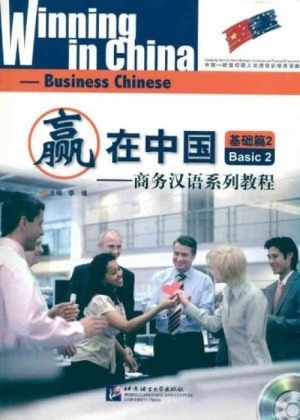- 出版社: 北京语言大学出版社; 第1版 (2010年7月1日)
- 平装: 168页
- 语种: 简体中文, 英语
- 开本: 16
- ISBN: 9787561928042, 7561928041
- 条形码: 9787561928042
- 商品尺寸: 28.2 x 20.8 x 1.2 cm
- 商品重量: 499 g

基本信息
商品描述
编辑推荐
《赢在中国:商务汉语系列教程(基础篇2)》:中国—欧盟经理人交流培训项目资助。
目录
词类简称表Abbreviations of parts of speech
语法术语简称表Abbreviations of grammatical terms
主要人物介绍Introduction of the main characters
第六单元 学校附近有超市吗
课文一Text 1:学校附近有超市吗
Is there a supermarket near the school
注释Notes:
1.“有”字句(2)The“有”.sentence(2)
2.动词“在”The verb“在
3.“南边”、“北边”及方位词介绍
“南边”,“北边”and an introduction of locality nouns
4.副词“更”The adverb“更
5.疑问代词“怎么”(复习)The interrogative pronoun“怎么”(Review)
6.指路的表示法How to ask for directions
7.副词“就”The adverb“就
课文二Text 2:收银台在哪儿 L Where is the cashier
注释Notes:
1.介词一在”(复习)The preposition“在”(Review)
2.副词“不用”The adverb“不用
3.方位词“下”及单纯方位词
The locality noun“下”and simple locality nouns
4.动态助词“着”The aspect pardcle“着”
5.人称代词“自己”The personal pronoun“自己”
6.方位词“旁边”及合成方位词
The locality noun“旁边”and compound locality nouns
课文三Text 3:机场离这儿远吗
Is the airport far away from here
注释Notes:
1.动词“离”The verb“离”
2.副词“大概”The adverb“大概”
3.副词“多”The adverb“多”
4.假设复句:“(如果/要是)……的话,……就……”
The hypothetical complex sentence:“(如果/要是)01 0 011的话,……就……”
5.副词“差不多”The adverb“差不多”
6.疑问代词短语作定语
The interrogative pronoun phrase acts as an attribute
7.副词“已经”The adverb“已经”
8.表示新情况的语气助词“了:”
The modal particle“了2”used to indicate a new situation
9.“没问题”
10.能愿动词“得(dei)”The optative verb“得(dei)”
11.语气助词“呢”The modal particle“呢”
12.动态助词“了l”The aspect particle“了l”
第七单元 今天我请客
课文一Text 1:最近他家正在打折呢
They are having a discount these days
注释Notes:
1.动词“请”The verb“请”
2.语气助词“哇”The modal particle“哇”
3.“正在……呢”
4.形容词“火”The adjective“火”
5.双宾语句A sentence with double objects
课文二Text 2:请点菜Would you please order you meal
注释Notes:
1.“不好意思”
2.可能补语Complement of possibility
3.副词“还是”The adverb“还是”
4.“那就……”
5.“看着+V”
6.“买单”
7.“AA(制)”
8.结果补语Complement of result
9.语气助词“嘛”The modal particle“嘛”
第八单元 请问,赫总经理在吗
课文一Text 1:您的电话号码是多少
Can I have your Telephone numbet
注释Notes:
1.能愿动词“可以”The optative verb“可以”
2.复合趋向补语Compound complement of direction
3.电话号码的读法The pronunciation of telephone numbers
课文二Text 2:后天您有空儿吗
Are you free the day after tomorrow
注释Notes:
1.连动句A sentence with serial verbs
2.副词“正好”The adverb“正好”
3.离合词Verb-object compound
4.连词“不过”The conjunction“不过”
5.主谓谓语句A subject-predicate predicate sentence
6.名词“时候”The noun“时候”
7.指示代词“这么”The demonstrative pronoun“这么”
8.习惯用语“那就这么定了”The idiom“那就这么定了”
课文三Text 3:你有什么事儿吗What’s up
注释Notes:
1.“哪位”
2.疑问代词“怎么”The interrogative pronoun“怎么”
辨析:“怎么”、“为什么”Discrimination:“怎么”and“为什么”
3.疑问代词的虚指用法
Usage of indefinite reference of some interrogative pronouns
4.动态助词“过”The aspect particle“过”
5.“还没……呢”
6.动词“随便”The verb“随便”
7.主谓短语作宾语A subject-predicate phrase acts as an object
8.12星座12 Zodiac Signs
9.副词“最”The adverb“最”
10.叹词“嗯”The interjection“嗯”
11.能愿动词“应该”、“会”The optative verbs“应该”and“会”
12.语气助词“的”The modal particle“的”
13.插入语“对了”The parenthesis“对了”
……
第九单元 明天天气怎么样
第十单元 你喜欢什么运动
生词总表
文摘
插图:

 |
|









































